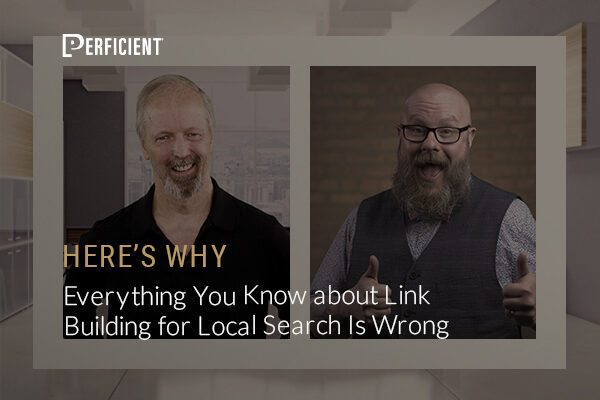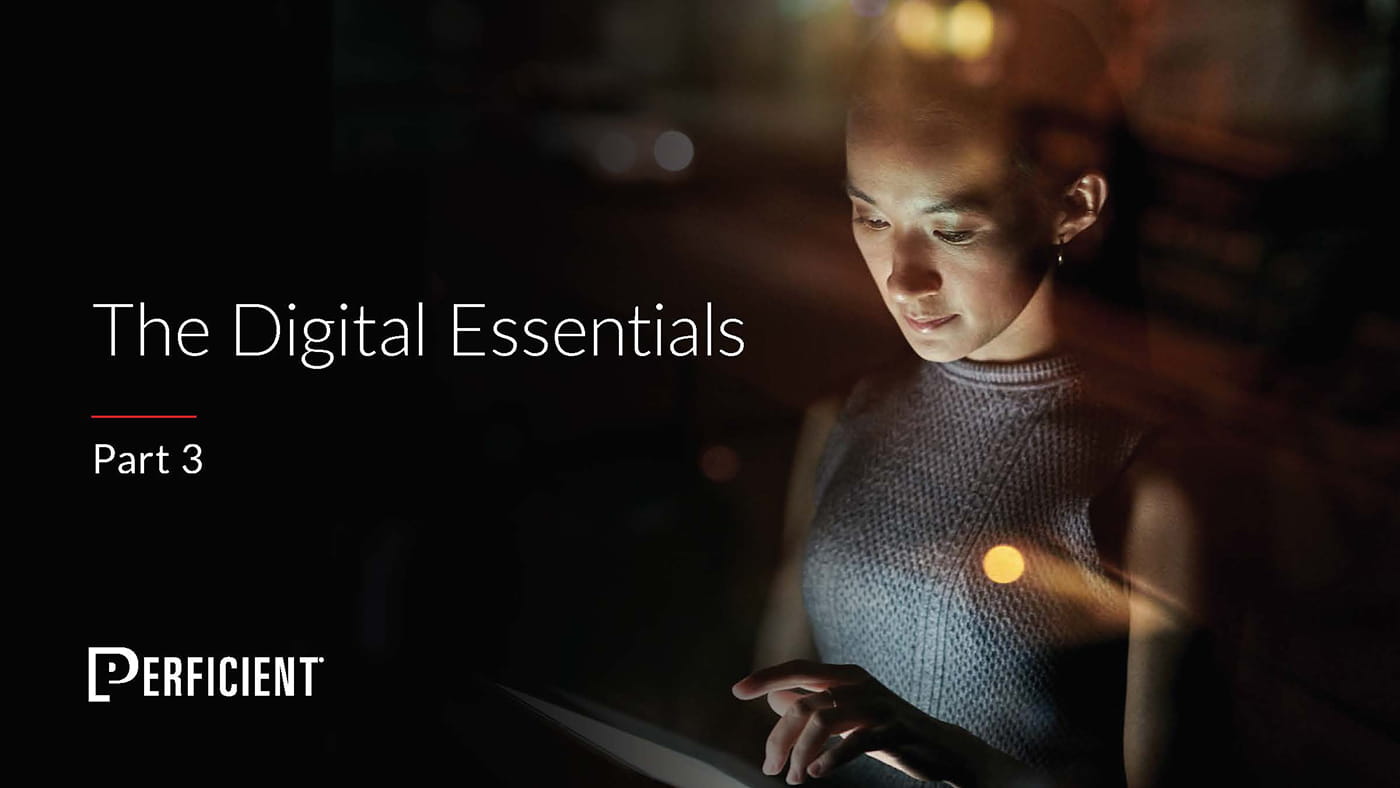Most of what you read about link building or hear at conferences isn’t helpful. And when you narrow that down to link building for local search, it’s even more challenging to find useful information.
In this episode, Greg Gifford, SearchLabs’ Vice President of Search, joins Eric Enge to share the differences between local link building and national-scale link building, as well as suggestions for succeeding in your local search efforts.
Don’t miss a single episode of Here’s Why. Click the subscribe button below to be notified via email each time a new video is published.
Resources
- Research Study: Links as a Ranking Factor
- Why Links Still Matter in 2020
- See all of our Here’s Why Videos | Subscribe to our YouTube Channel
Transcript
Eric: Hey, everyone. Eric Enge here. I’m the Principal for the Digital Marketing Solutions business unit at Perficient. And welcome to another episode of “Here’s Why.” Today, please help me welcome Greg Gifford. Greg is the Vice President of Search at SearchLab and he’s been working in the search industry since 2002, and he hosts a weekly video series called “Local Search Tuesdays.” You’re going to be challenged to find anyone in the whole industry that knows more about local research than Greg. And it’s great to have you here, Greg.
Greg: Hey, happy to be here. Thanks for having me.
Eric: Absolutely. So I’m going to just tee us off here with some opening thoughts. We were talking the other day, Greg. And one of the things that you mentioned to me is that really most of what you hear or read about link building, what you see at conferences and the like, is usually not that helpful.
The information tends to be very generalized. It might be these cherry-picked amazing case studies with huge results rather than the basic day-to-day blocking and tackling that a lot of us really have to do. So we really need to create a little bit of a different perspective about how to approach this, I think. And the algorithm is different as well.
So tell us, Greg, how does Google really weigh local links, and think about links differently in local search?
Greg: You know, it’s the same thing you always have to talk about when you look at any sort of presentation at a conference or video online or blog post online or site grader tools. They’re all really general and not specific to any one particular area. And Google does have a separate local algorithm. And the algorithm weights things differently than the traditional algorithm. So Google understands at a high level that an SMB is a different entity than a big, massive, international or national e-commerce type brand.
So the algorithm is going to work differently. Because the scale is different, it has to weight things differently. And with links, it doesn’t really pay attention to a lot of the traditional things that you hear about, authority metrics, follow/nofollow doesn’t matter because nofollow links work because most small businesses have a really small number of links. And if it wasn’t going to count nofollow links, then most businesses wouldn’t have links at all. So nofollow links matter.
You really want to get links from local entities. So a link from a dry cleaner up the street, traditionally, you’re not going to go after that because it’s got a low authority metric, it’s an ugly site, it’s a really small site without a lot of traffic. But in local SEO, that’s a great link to get because that really small link is locally focused and getting links from local entities reinforces your local relevance.
It’s all about, you’ve got to understand that Google looks at local businesses differently. So the scale is different, the weights are different, which means you have to take a different approach to link building. As you think about these things, you can’t use all those things that you mentioned earlier you see as the big, ego-piece, cherry-picked thing. So, you know, how is it that typically businesses should approach link building differently?
Eric: Well, I mean, I think you kind of called it out really great with your local dry cleaners example. It’s like, if it’s a local business, I think one of the big, powerful unique assets you have is the fact that you’re, wait for it, local. So the best way to really draw that out is by being an active participant in the local community. Just be a part of that community, be a leader in that community, and develop those relationships.
Maybe it is with the local dry cleaner, or the local law office, or the Chamber of Commerce, or things like that. But by being kind of that leader and active participant in the community, you can stimulate a lot of the things that could potentially lead to links for you. But I want to leave the detail on that to you. After that high-level view, what do you really do in practice to drive those local links?
Greg: Well, one of the most important things to realize is it’s a lot easier to get local links because since you are basing it off of those relationships and the real-world things, you don’t have to go through all the effort and, create a big piece of content and outreach to a bunch of people. You can just do a couple of little things and get links pretty quickly. And it’s almost like marketing has come full circle. All the things that businesses used to do to get exposure in the community and then they kind of stopped doing when the internet came out, that’s now the things that businesses should do because it leads to awesome link opportunity.
So, you know, sponsoring local events. That’s a great one. Sponsor a golf tournament, a 5K, a marathon, anything like that. You know, you mentioned Chamber of Commerce type stuff, the local business associations, join them all. It’s totally worth it. And it reinforces that local relevancy. You can host events, you know, sales events, meetings, local things, even stuff outside of what your business does, community events that you can host at your business or place of business or outside, those are important.
Donating to charities, donating time to support local organizations and volunteer opportunities, and things like that. One of the big things that we came across was neighborhood watch sites because every neighborhood has got some dude in the neighborhood that’s like, “I can make a WordPress site. Let’s have a WordPress site.” And then they need content. So if you can get anything there that’s worthwhile or any sort of neighborhood-specific offer, then that’s great. And that links relevant down to a neighborhood level. So it’s really valuable.
And then helping out other local businesses and your friends. And, giving the local newspaper, the local TV station things to write about because everything’s gone digital, and they’re kind of struggling for things to write about. So if you’ve got anything newsworthy there.
Meetup.com is a great place to go to. You can look for local groups that have regular monthly meetings, throw in a couple of bucks to buy their pizzas and their soft drinks, you get some links there. Like, there’s so many opportunities if you look at real-world activities that lead to awesome local link-building opportunities.
Eric: This has been great, Greg. Thanks for that insight about how local link building is different from that national-scale link building in so many different fundamental ways. And the fun part is, it’s potentially even quite a bit easier because it’s so much simpler as you illustrated. But thanks so much for joining me today.
Greg: Hey, thanks for having me. It was my pleasure.
Eric: And thank you all for watching today’s episode. If you liked it, please consider clicking on the subscribe now button that you see below now, so you won’t have to miss any other future episodes.
Don’t miss a single episode of Here’s Why. Click the subscribe button below to be notified via email each time a new video is published.
See all of our Here’s Why Videos | Subscribe to our YouTube Channel

